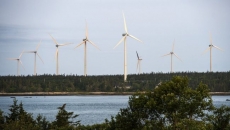Most Canadians don't think the quality of health care in their province is likely to improve, a new survey suggests, despite new federal health accords with several provinces designed to quell the health-care crisis unfolding across Canada.
The poll by Leger comes nearly a year after the federal government offered a $196-billion health accord to the provinces to increase health funding and address a growing shortage of health-care workers.
Doctors, nurses and other health-care professionals have warned for years about a dangerous lack of health workers, leading to understaffed emergency rooms and a lack of primary care that is felt across the entire health system.
The survey found Canadians are feeling the impact, as 70 per cent of respondents say they worry they won't be able to get good quality medical care if they or a family member need it.
So far, Alberta, British Columbia, Prince Edward Island, Nova Scotia and the Northwest Territories have signed one-on-one deals with the federal government to increase federal health funding and target weak points in their respective systems.
Even as governments show signs of working together to improve the situation, only 17 per cent of poll respondents said they felt the state of health care is likely to improve in the next two years.
Leger's web survey of 1,536 Canadian adults cannot be assigned a margin of error because online polls are not considered truly random samples.
A whopping 87 per cent of people surveyed in Atlantic Canada said they worry they won't be able to get the care they need.
People in Atlantic Canada and Quebec were also more likely to rate their health systems as poor or very poor, at 66 per cent and 51 per cent respectively.
Meanwhile, 46 per cent of people in Alberta and 40 per cent of people in B.C. said their health-care systems were good.
Leger asked people to choose words that come to mind when they think about Canada's health-care systems, 66 per cent chose "long waits," 42 per cent chose "stressed" and 40 per cent chose "failing."
When asked about the shortage of health-care workers, 67 per cent of respondents pointed to poor working conditions and long hours in hospitals.
Forty per cent said the problem was due to health funding cuts, and another 40 per cent blamed retirements during the COVID-19 pandemic.
Last year, provincial premiers clamoured for the prime minister to negotiate a new health funding deal to address the ailing state of their health-care systems.
All provinces except Quebec have signed onto Ottawa's deal in principle.
Provinces have until March to sign a tailored one-on-one deal with Ottawa to access the funding.






